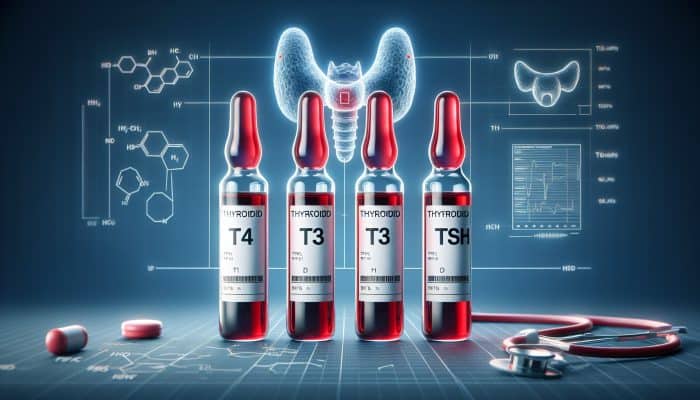Explore the Importance of Thyroid Blood Testing for Optimal Health Management
Key Hormones Analyzed in Thyroid Blood Testing and Their Health Implications

The Thyroid Blood Test in Worthing is an essential procedure aimed at evaluating the levels of critical thyroid hormones, namely thyroxine (T4), triiodothyronine (T3), and thyroid-stimulating hormone (TSH). Monitoring these hormone levels is vital for gaining comprehensive insights into overall thyroid function and plays a crucial role in diagnosing various thyroid-related disorders. For example, <a href="https://bloodtest.co.uk/hypothyroidism-in-men-the-impact-on-health/">hypothyroidism</a> arises from insufficient thyroid activity, while an overactive thyroid is a hallmark of hyperthyroidism. By thoroughly assessing these hormone levels, healthcare professionals can ascertain if the thyroid is functioning optimally and identify any imbalances that could negatively impact your overall health and well-being.
Thyroid hormones play a pivotal role in regulating several key bodily functions, including metabolism, energy production, and emotional stability. For instance, diminished levels of T4 may indicate hypothyroidism, manifesting in symptoms such as fatigue, weight gain, and mood fluctuations. Conversely, elevated levels may point to hyperthyroidism, which can lead to symptoms like weight loss, heightened anxiety, and a rapid heartbeat. Consequently, a thyroid blood test is invaluable in furnishing essential insights regarding your overall health and wellness, guiding both you and your healthcare provider in making informed decisions regarding your health trajectory.
Step-by-Step Guide to the Thyroid Blood Testing Process
The thyroid blood test procedure is straightforward and generally involves the collection of a small blood sample. A trained healthcare professional will draw blood from a vein in your arm in a quick process that typically results in minimal discomfort. Once the blood sample is taken, it is dispatched to a laboratory where skilled technicians perform a detailed analysis of the hormone levels present.
After the analysis is complete, your healthcare provider will interpret the results in conjunction with your symptoms and medical history, providing a holistic view of your thyroid health. While the blood draw itself is uncomplicated, comprehending the preparatory steps and the implications of the results can greatly influence the management of any thyroid-related conditions. Many individuals are eager to learn about their thyroid health, making it crucial for patients to feel well-informed and supported throughout the entire testing journey.
The Importance of Thyroid Blood Testing: When and Why It Is Recommended
Healthcare professionals may recommend a thyroid blood test based on a variety of symptoms or risk factors present in the patient. Common indicators that may prompt testing include persistent fatigue, unexplained weight fluctuations, mood variations, and changes in appetite. These symptoms can often be nonspecific and overlap with various other health issues, highlighting the critical importance of thyroid testing as a key diagnostic tool.
Additionally, a family history of thyroid disorders serves as an important consideration. If relatives have experienced conditions such as hypothyroidism or Graves’ disease, your physician may suggest routine testing as a preventive step to monitor your thyroid function. This proactive approach can facilitate early diagnosis and treatment, ultimately leading to better health outcomes. Therefore, if you are experiencing concerning symptoms or have a family history of thyroid issues, it is prudent to consult your healthcare provider regarding the necessity of undergoing a thyroid blood test.
Professional Insights on Thyroid Blood Testing Services Available in Worthing

Innovative Advances Revolutionizing Thyroid Testing Techniques
The domain of thyroid testing has witnessed remarkable advancements in recent years, culminating in tests that are more sensitive and precise than ever before. These cutting-edge innovations now enable healthcare professionals to detect even minor abnormalities in thyroid function, thus facilitating earlier diagnosis and intervention. Some noteworthy advancements include:
- Highly sensitive TSH tests capable of identifying lower levels of thyroid hormones.
- Free T4 and Free T3 tests that provide a clearer understanding of the active hormone levels present in the body.
- Thyroid antibody tests designed to detect autoimmune thyroid conditions, such as Hashimoto’s disease.
- Advanced imaging techniques, including ultrasound, are utilized to assess structural abnormalities in the thyroid gland.
These innovations significantly enhance clinical outcomes, empowering healthcare providers to develop more tailored treatment plans for patients. In Worthing, local healthcare providers are increasingly integrating these state-of-the-art testing technologies, ensuring that residents receive the most effective care customized to their unique health needs.
Collaborative Support from Local Specialists for Effective Thyroid Testing
Local endocrinologists and general practitioners (GPs) in Worthing play a vital role in the management of thyroid health. They not only conduct tests but also interpret results and formulate treatment strategies that are specifically tailored to the individual’s needs. For instance, Dr. Sarah Hayes, an esteemed endocrinologist at Worthing Hospital, has successfully guided numerous patients through the complexities of thyroid disorders, earning recognition for her thorough and compassionate approach to care.
Furthermore, collaboration with local specialists ensures that patients receive expert guidance on effectively managing thyroid conditions. Case studies from Worthing have demonstrated the benefits of early intervention, revealing that patients referred for testing after exhibiting initial symptoms of thyroid dysfunction often experience significant health improvements following timely treatment. These real-world examples underscore the importance of consulting local experts when addressing thyroid health concerns.
What to Expect During Your Thyroid Blood Test Appointment

During your appointment for a thyroid blood test, the process is generally swift and efficient. A healthcare professional will begin by explaining the steps involved in the procedure. Initially, they will inquire about your symptoms, medical history, and any medications you are currently taking to provide context for the test. This initial discussion is crucial, as it allows the provider to gain a comprehensive understanding of your health and tailor the testing process accordingly.
Once everything is settled, the healthcare professional will prepare to draw your blood. You may feel a slight prick as the needle enters your vein, but the discomfort is typically minimal and brief. After your blood sample is collected, it will be sent to a laboratory for thorough analysis. While waiting for the results, it is advisable to maintain open communication with your healthcare provider, as they can offer insights into what to expect and how to interpret the results once they become available.
Where to Find Thyroid Blood Testing Services in Worthing
Clinics in Worthing Offering Comprehensive Thyroid Blood Testing
Residents of Worthing have numerous options for obtaining a thyroid blood test. Notably, Worthing Hospital provides comprehensive testing services, and a variety of private practices also offer these tests. Many private clinics are recognized for their quick turnaround times on test results and personalized patient care. It is important to check availability and schedule an appointment in advance, especially during peak periods when demand for testing services may rise.
In addition to traditional healthcare facilities, some pharmacies in Worthing are beginning to offer blood testing services. These can be an excellent option for individuals seeking convenience and efficiency. It is advisable to call ahead to confirm the specific services offered and whether appointments are necessary.
Availability of Thyroid Blood Tests at General Practitioner Offices in Worthing
Yes, several GP surgeries in Worthing provide thyroid blood tests as part of their diagnostic services. However, it is often required to first have a consultation with your GP. During this consultation, they will evaluate your symptoms and, if appropriate, provide you with a referral for the test. This method allows for a more personalized assessment, ensuring that any underlying health issues are thoroughly addressed.
During your consultation, be prepared to discuss your medical history and any symptoms you have been experiencing, as this information is critical for your GP to determine the most effective course of action. After the test, your GP will review the results with you and discuss any necessary next steps, making them an integral part of your healthcare journey.
Exploring Walk-in Options for Thyroid Blood Tests in Worthing
While some urgent care centers in Worthing may offer walk-in options for a thyroid blood test, it is generally advisable to call ahead to confirm availability. These centers can be particularly beneficial for individuals who may not have easy access to regular healthcare services or require immediate testing.
Hospitals and some community health clinics might also provide walk-in services on specific days, but it is prudent to verify this before visiting. Always check for any necessary preparations, such as whether fasting is required or if there are specific forms to bring, to ensure that your visit goes smoothly.
Understanding the Cost of Thyroid Blood Testing in Worthing
The cost of a thyroid blood test in Worthing can vary significantly based on the testing facility you choose. If you opt for a private clinic, prices typically range from £50 to £150, depending on the comprehensiveness of the testing and any specific services included. These costs can accumulate, especially if multiple tests are performed.
In contrast, if you choose to undergo your test through the NHS, it is generally covered as long as it is deemed medically necessary. However, you will need a referral from your GP. It is always wise to inquire about the costs upfront, especially if you are considering private options, allowing you to make an informed decision based on your budget and healthcare requirements.
Crucial Preparations for Your Thyroid Blood Test
Is Fasting Required Before Undergoing a Thyroid Blood Test?
Generally speaking, fasting is not necessary prior to a thyroid blood test. Most individuals can eat and drink normally before the test unless their healthcare provider has given specific instructions to the contrary. This aspect simplifies the preparation process for patients, minimizing any discomfort or disruption to their daily routines.
However, it is essential to follow any specific guidance provided by your healthcare provider. In certain cases, they may recommend avoiding particular foods or supplements that could interfere with the accuracy of the test results. Always ensure you have a clear understanding of any pre-test requirements to achieve optimal results.
Medications to Discuss with Your Doctor Prior to Testing
Certain medications can indeed impact thyroid hormone levels, making it imperative to inform your doctor about all medications you are currently taking. Common medications that might influence the results include specific antidepressants, steroids, and hormone therapies. Your healthcare provider will advise you on whether any of these should be temporarily discontinued before the test.
Additionally, if you are taking any supplements, particularly those containing iodine, be sure to mention these, as they can also impact thyroid function. By providing your doctor with a comprehensive list of medications and supplements, you can help ensure that your thyroid blood test results are as accurate as possible, facilitating the development of the most effective treatment plan.
Essential Items to Bring to Your Thyroid Blood Test Appointment
When preparing for your thyroid blood test appointment, it is prudent to bring several essential items. Firstly, your identification is critical for administrative purposes. Additionally, you should carry any relevant medical records, particularly if you have undergone previous tests or treatments related to your thyroid.
It is equally important to have a detailed list of your current medications, including dosages. If you are experiencing specific symptoms, jotting down a list of these can also be beneficial. This preparation enables the healthcare professional to have a clear understanding of your health status, which can lead to more accurate testing and improved overall care.
Understanding the Benefits of Thyroid Blood Testing
How Early Detection of Thyroid Disorders Enhances Health Outcomes
Early detection of thyroid issues through a thyroid blood test can significantly improve health outcomes. Timely diagnosis allows for prompt treatment, which can prevent complications associated with untreated thyroid disorders. Conditions such as heart disease, infertility, and mental health issues can be mitigated through early intervention. Key benefits of early detection include:
- Reduced risk of complications associated with untreated thyroid dysfunction.
- Enhanced quality of life through effective symptom management.
- Improved metabolic control that can reduce the risk of obesity and diabetes.
- Greater emotional stability and improved mental well-being.
With thyroid disorders affecting millions of individuals worldwide, understanding the benefits of early detection can motivate people to seek testing and consult their healthcare professionals regularly. By prioritizing thyroid health, you are making a significant investment in your overall well-being and quality of life.
Can a Thyroid Blood Test Support Weight Management Efforts?
A thyroid blood test plays a crucial role in identifying thyroid conditions that can directly affect metabolism, which in turn influences weight management efforts. Thyroid hormones are integral to how the body processes energy; thus, imbalances can lead to unexplained weight gain or loss. For example, hypothyroidism is often linked with weight gain, while hyperthyroidism may result in weight loss.
By identifying these hormonal imbalances early through testing, patients can receive appropriate treatments aimed at normalizing their thyroid levels. This not only supports weight management but also contributes to overall metabolic health. Patients who successfully treat their thyroid conditions frequently report improved energy levels and metabolism, making it easier to manage their weight effectively.
The Role of Thyroid Blood Tests in Supporting Overall Health and Wellness
Regular thyroid blood tests can serve as a foundational element of comprehensive health assessments, ensuring optimal thyroid function. Thyroid hormones influence various bodily functions, including metabolism, heart rate, and even emotional well-being. Therefore, maintaining hormonal balance is essential for overall wellness.
Monitoring thyroid levels can help prevent potential health issues, allowing for timely treatment when necessary. This proactive approach not only enhances energy levels but also supports mental clarity and emotional stability. Incorporating thyroid testing into routine healthcare can lead to substantial improvements in both physical health and mental well-being, making it an essential component of holistic wellness.
How Tracking Thyroid Levels Contributes to Mental Health
Monitoring thyroid levels through regular thyroid blood tests can significantly benefit mental health. Thyroid hormones are closely linked to mood regulation; imbalances in these hormones can lead to conditions such as depression and anxiety. For instance, low thyroid hormone levels often correlate with depressive symptoms, making it essential to address these imbalances promptly.
By routinely checking thyroid function, healthcare providers can ensure that hormone levels remain within optimal ranges, thereby contributing to mood stability and emotional resilience. Patients who receive adequate treatment and monitoring frequently report improvements in their mental health, further emphasizing the crucial role of thyroid health within the broader context of overall emotional well-being. Regular testing thus serves as an invaluable tool in maintaining mental health and quality of life.
Strategic Approaches to Thyroid Blood Testing in Worthing
Determine How Often You Should Have a Thyroid Blood Test
The frequency of thyroid blood tests largely depends on your individual health status and risk factors. For individuals with known thyroid disorders or a family history of such conditions, testing may be recommended every 6 to 12 months. Conversely, if you are experiencing symptoms suggestive of thyroid dysfunction, your healthcare provider may suggest more frequent testing until your condition stabilizes.
To optimize management, consider establishing a personalized thyroid testing schedule tailored to your health needs. This proactive approach ensures that any changes in thyroid function are detected early, facilitating timely intervention. Consult your healthcare provider about the most suitable testing frequency for you, as maintaining regular monitoring can significantly enhance your overall health management and outcomes.
Essential Questions to Discuss with Your Doctor Regarding Thyroid Testing
When preparing for a thyroid blood test, it is vital to have a clear understanding of the process and what to expect. Here are some essential questions you should consider asking your doctor:
- What is the primary purpose of the thyroid blood test?
- What do the results indicate regarding my thyroid health and overall well-being?
- Are there any medications that I should avoid before the test?
- What are the next steps if my results reveal a thyroid issue?
Asking these questions not only demonstrates your engagement in your healthcare but also fosters a collaborative relationship with your healthcare provider. Their responses will provide clarity on thyroid testing and empower you to take an active role in managing your thyroid health effectively.
How to Effectively Understand Your Thyroid Blood Test Results
Interpreting your thyroid blood test results involves examining the levels of T4, T3, and TSH while comparing these values to established normal ranges. Typically, elevated TSH levels suggest hypothyroidism, while low levels may indicate hyperthyroidism. Free T4 and Free T3 results also provide valuable insights into your thyroid function and hormonal health.
Your healthcare provider will explain what your specific results mean in relation to your health status. They will take into account your symptoms and medical history while discussing any necessary treatment options. Understanding these results can be complex, so do not hesitate to seek clarification on any points you do not understand. Your active participation in understanding your health will lead to better management of any thyroid conditions and improved overall health outcomes.
Accessing Thyroid Blood Testing in Worthing: A Guide
In Worthing, there are numerous avenues for obtaining a thyroid blood test. Local clinics, such as Worthing Hospital, offer comprehensive testing services, and various private healthcare providers are also available for those seeking quicker results. Some pharmacies are beginning to provide blood testing services, which can be highly convenient for patients.
To find a suitable location, consider searching online for local clinics specializing in thyroid testing. It is advisable to contact the clinic directly to inquire about appointment availability and any specific preparations required. This proactive research can greatly enhance your testing experience and ensure timely results.
Necessary Preparations Before Undergoing a Thyroid Blood Test
Preparation for a thyroid blood test is generally straightforward. Most patients do not need to fast, making it easier to fit into their daily routines. However, always adhere to any specific instructions given by your healthcare provider, as they may have tailored recommendations based on your health history and individual needs.
Be sure to inform your doctor about all medications and supplements you are currently taking, as some may need to be adjusted before testing. Additionally, bring along your identification and relevant medical records to ensure a smooth experience. By being well-prepared, you can contribute to the accuracy of your test results and enhance your understanding of your thyroid health journey.
Assessing Costs and Insurance Coverage for Thyroid Blood Tests in Worthing
Typical Costs Associated with Thyroid Blood Testing in Worthing
The cost of a thyroid blood test in Worthing can vary based on the testing facility you select. Private clinics typically charge between £50 and £150, depending on the comprehensiveness of the testing and any additional services provided. If you opt to have the test performed through the NHS, it is usually free of charge, provided it is deemed medically necessary by your GP.
It is advisable to inquire about costs upfront, especially if you are considering private options, to ensure that the expenses align with your budget. Furthermore, reviewing your insurance coverage can provide clarity on potential reimbursements for the test if you go through a private provider, allowing you to make informed decisions about your healthcare expenditures.
NHS Coverage for Thyroid Blood Tests in Worthing
Yes, the NHS typically covers thyroid blood tests when they are considered medically necessary. Patients usually require a referral from their GP to have the test conducted under the NHS. This referral process allows for a thorough evaluation of symptoms and medical history, ensuring that the test is appropriate for your specific situation.
Once referred, your GP will guide you through the next steps, including where to go for testing. This system not only supports patients in accessing necessary healthcare services but also helps keep treatment costs manageable. Always discuss any concerns or questions regarding coverage with your GP during your consultation to ensure clarity on the process.
Insurance Plans and Thyroid Blood Testing Coverage in Worthing
Many private health insurance plans in the UK often include coverage for thyroid blood tests as part of their benefits, particularly if they are deemed medically necessary. However, coverage can vary significantly among different providers, making it essential to review the specifics of your plan. Contacting your insurance provider directly can clarify what is covered and any potential out-of-pocket expenses you may incur.
Additionally, ask your healthcare provider if they accept your insurance plan, as this can influence where you choose to have your test performed. Understanding your insurance coverage allows you to make informed decisions about your healthcare and effectively manage costs associated with thyroid testing.
Potential Additional Fees Related to Thyroid Blood Testing in Worthing
While many thyroid blood tests are straightforward, some clinics may impose extra fees for services such as consultations or follow-up appointments. It is advisable to inquire about these potential costs beforehand to avoid unexpected charges. For example, if you need a follow-up consultation after your test results are available, ensure you understand the associated fees.
Moreover, if you pursue testing through a private clinic, ask about any additional costs related to expedited services or further tests that may be recommended. By proactively discussing these aspects with your healthcare provider, you can ensure a comprehensive understanding of the financial implications associated with your thyroid testing experience.
Your Frequently Asked Questions Regarding Thyroid Blood Testing
What Is the Purpose of Conducting a Thyroid Blood Test?
A thyroid blood test measures the levels of thyroid hormones and TSH, assessing thyroid function and aiding in the diagnosis of conditions such as hypothyroidism and hyperthyroidism.
How Is a Thyroid Blood Test Conducted?
The test involves taking a small blood sample from a vein, typically in your arm, which is then sent to a laboratory for thorough analysis.
What Reasons Might Prompt a Thyroid Blood Test?
If you experience symptoms such as fatigue, weight changes, or mood swings, or have a family history of thyroid disorders, your doctor may recommend a test.
Where Can I Obtain a Thyroid Blood Test in Worthing?
In Worthing, you can receive a thyroid blood test at Worthing Hospital, various private clinics, and some GP surgeries.
What Is the Typical Cost of a Thyroid Blood Test in Worthing?
The cost varies, with private tests ranging from £50 to £150, while NHS tests are generally free if deemed medically necessary.
Is Fasting Required Before My Thyroid Blood Test?
Generally, fasting is not required, but you should follow any specific instructions provided by your healthcare provider.
What Medications Should I Discuss with My Doctor Before the Test?
Some medications can affect thyroid hormone levels; inform your doctor about all medications you are taking so they can provide appropriate guidance.
How Frequently Should I Undergo a Thyroid Blood Test?
The frequency depends on individual health factors; those with thyroid disorders may need testing every 6 to 12 months.
What Essential Questions Should I Ask My Doctor About Thyroid Testing?
Inquire about the purpose of the test, what the results indicate, and the next steps if abnormalities are found.
What Items Should I Bring to My Thyroid Blood Test Appointment?
Bring identification, relevant medical records, and a list of current medications to your appointment for optimal preparation.
Connect with Us on Facebook!
This Article Was First Published On https://bloodtest.co.uk
The Article Thyroid Blood Test: A Local Guide for Worthing Residents Was Found On https://limitsofstrategy.com

